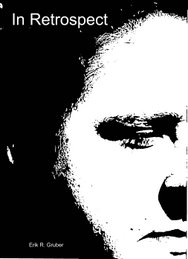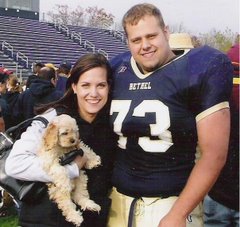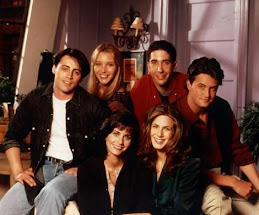 1) The Exorcist (1973): Demons are scary. So are little girls in horror movies. Combine the two, and you have The Exorcist. I hadn’t seen this one till just a few days ago, and now am forever scarred by images of Linda Blair spider-walking down the staircase (only available in the extended version – released 2000). Based on a true story (which makes it even scarier), the film tells the tale of Regan, a young girl exhibiting some strange (ie malicious, vile, downright nasty) habits and the priests who attempt to help her. You’ll think you’re going to make it through just fine…until her head spins. I mean all the way around.
1) The Exorcist (1973): Demons are scary. So are little girls in horror movies. Combine the two, and you have The Exorcist. I hadn’t seen this one till just a few days ago, and now am forever scarred by images of Linda Blair spider-walking down the staircase (only available in the extended version – released 2000). Based on a true story (which makes it even scarier), the film tells the tale of Regan, a young girl exhibiting some strange (ie malicious, vile, downright nasty) habits and the priests who attempt to help her. You’ll think you’re going to make it through just fine…until her head spins. I mean all the way around.
2) The Thing (1982): Isolated, claustrophobic paranoia at its finest. The Thing follows a group of researchers to the Antarctic, where they find the remains of a spacecraft and are subsequently infected by an alien life form. The problem: there’s no way to tell who’s been infected. This movie is guaranteed to make you jump (or wet yourself if you have poor bladder control).
 3) The Exorcism of Emily Rose (2005): I realize I already have an exorcism movie on the list, but what can I say: Satan is scary. This movie is part horror film, part courtroom drama. The story centers around a priest accused of criminal wrongdoing after a young girl dies while in his care. The catch: the girl may or may not have been possessed. The exorcism scene will leave you crying yourself to sleep, only to find yourself awake at 3 AM (you’ll see why). Plus, the debate between religion and science is genuine, approached objectively, and very intriguing.
3) The Exorcism of Emily Rose (2005): I realize I already have an exorcism movie on the list, but what can I say: Satan is scary. This movie is part horror film, part courtroom drama. The story centers around a priest accused of criminal wrongdoing after a young girl dies while in his care. The catch: the girl may or may not have been possessed. The exorcism scene will leave you crying yourself to sleep, only to find yourself awake at 3 AM (you’ll see why). Plus, the debate between religion and science is genuine, approached objectively, and very intriguing.4) Frailty (2001): The story of two sons raised by a fanatically religious father who believes he is
 on a mission from God to destroy demons who inhabit the bodies of regular people. As the boys grow older, one believes, the other thinks his dad is psychotic. The ending will leave you speechless as you ponder which is scarier: the existence of such violent madmen, or the possibility that they may be perfectly sane…
on a mission from God to destroy demons who inhabit the bodies of regular people. As the boys grow older, one believes, the other thinks his dad is psychotic. The ending will leave you speechless as you ponder which is scarier: the existence of such violent madmen, or the possibility that they may be perfectly sane… 5) Freaks (1932): Freaks is a story of betrayal and revenge, set inside a circus freak- show. Cleopatra is a beautiful trapeze artist. Her lover, Hercules, is the resident strong man. When the two of them learn that a midget named Hans has come into a large inheritance they plot to steal his money by having Cleopatra seduce and marry him. But the rest of the freaks get wind of the scheme and all hell breaks loose. This was made well before the days of special effects or CGI (or political correctness), so all the “freaks” are, as you can guess, legit. A movie like this will never (and can never) be made again.
5) Freaks (1932): Freaks is a story of betrayal and revenge, set inside a circus freak- show. Cleopatra is a beautiful trapeze artist. Her lover, Hercules, is the resident strong man. When the two of them learn that a midget named Hans has come into a large inheritance they plot to steal his money by having Cleopatra seduce and marry him. But the rest of the freaks get wind of the scheme and all hell breaks loose. This was made well before the days of special effects or CGI (or political correctness), so all the “freaks” are, as you can guess, legit. A movie like this will never (and can never) be made again.6) Carrie (1976): Based on a Steven King novel of the same name, Carrie is the story of
 an unpopular and ridiculed teenage girl who discovers she has telekinetic powers. The scenes between Carrie and her abusive mother (who sees the power as a curse) are some of the most disturbing you’ll ever see. And we’ve seen enough movies about teenagers to know that when the popular boy asks the outcast girl to the prom, the poop’s about to hit the fan. I don’t know about you, but I find teenage girls horrifying to begin with. Imagine one hell-bent on bloody revenge.
an unpopular and ridiculed teenage girl who discovers she has telekinetic powers. The scenes between Carrie and her abusive mother (who sees the power as a curse) are some of the most disturbing you’ll ever see. And we’ve seen enough movies about teenagers to know that when the popular boy asks the outcast girl to the prom, the poop’s about to hit the fan. I don’t know about you, but I find teenage girls horrifying to begin with. Imagine one hell-bent on bloody revenge.Watch, enjoy, be terrified. Happy Halloween.
Thanks for reading.































